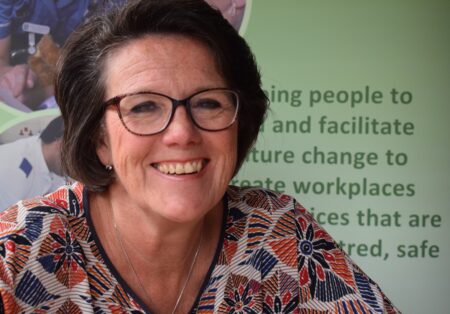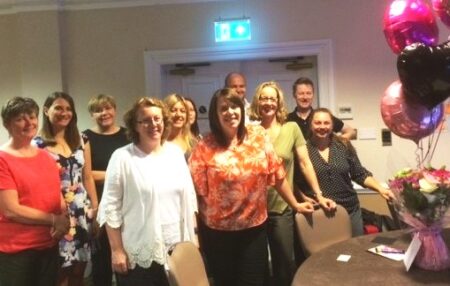Home News & Views Creating personal connections to learn, develop and improve
Creating personal connections to learn, develop and improve
Jo Odell, FoNS Practice Development Facilitator

Last week I had the pleasure of meeting up again with the Inspire Improvement Fellows (Inspire Improvement Programme) for the second set of two learning workshop days (the last ones were held in March 2018). Although I had been visiting each of the fellows individually in their workplaces, this was an opportunity for them to be together collectively, to have a ‘thinking and creative’ space away from their busy schedules as clinical leaders, for them to learn from each other and to plan the next steps of their Inspire Improvement journey towards creating more caring cultures.
 In between the first and second set of workshops, the fellows had been using a variety of social and email media to stay in touch. And it became very evident to me when everyone came together again, that there was a great connection and cohesiveness between each member of the group. Even on the first session of the day, where people were sharing their ‘Golden Moments’ (individual successes/highlights), everyone connected very quickly with a high level of energy, despite having been apart for three months and having travelled from various locations around the UK. A colleague from FoNS also joined us for part of the workshop and commented on how connected the group appeared to be; in the way they were working and interacting together. At the end of the workshops the fellows commented on how much they valued hearing others’ experiences and how inspired they were by what others had achieved. I feel this was summed up by the following three comments:
In between the first and second set of workshops, the fellows had been using a variety of social and email media to stay in touch. And it became very evident to me when everyone came together again, that there was a great connection and cohesiveness between each member of the group. Even on the first session of the day, where people were sharing their ‘Golden Moments’ (individual successes/highlights), everyone connected very quickly with a high level of energy, despite having been apart for three months and having travelled from various locations around the UK. A colleague from FoNS also joined us for part of the workshop and commented on how connected the group appeared to be; in the way they were working and interacting together. At the end of the workshops the fellows commented on how much they valued hearing others’ experiences and how inspired they were by what others had achieved. I feel this was summed up by the following three comments:
‘I feel like I’ve arrived home to my FoNS family!’
‘I feel I have reconnected with my FoNS journey’
‘No man is an island, entire of itself; every man is a piece of the continent, a part of the main’
One of the key elements of the Creating Caring Cultures resources (p 8) is enabling team working and staff wellbeing. In this section of the resources, FoNS discusses the strong links between staff engagement, where staff feel connected with each other, and patient outcomes, staff wellbeing, motivation and patient experience. Also, importantly, that effective leadership and staff relationships are vital to clinical workplace culture. By creating this connection during the workshop days, FoNS aims to role model how to create a safe, trusting and yet challenging learning environment where the fellows can ‘experiment’ and then develop ways to recreate this within their own teams. In the period between the workshops, each of the fellows had tried some sort of team engagement activity such as working with Evoke cards in team meetings or asking the question ‘what’s it like to work round here’ using creative methods such as via a poster. During the workshop, an active learning session (Dewing, 2008) was used to share and learn from these. The key learning from this session was ‘there is need to invest in creating connections to prosper’.
For all those of you working in clinical leadership positions, I would urge you to take the time to connect with people in your team and the people you care for. This is an valuable investment of your time as people create cultures and people need time; to be listened to, to be supported and to work together effectively. In short, culture change takes facilitative leadership, time and investment in people!
Dewing, J. (2008) Becoming and being active learners and creating active learning workplaces: the value of active learning in practice development. Chp 14 in Manley, K., McCormack, B. and Wilson, V. (Eds.) International Practice Development in Nursing and Healthcare. Oxford: Blackwell Publishing.
Comments are closed.

